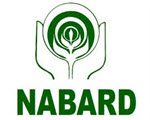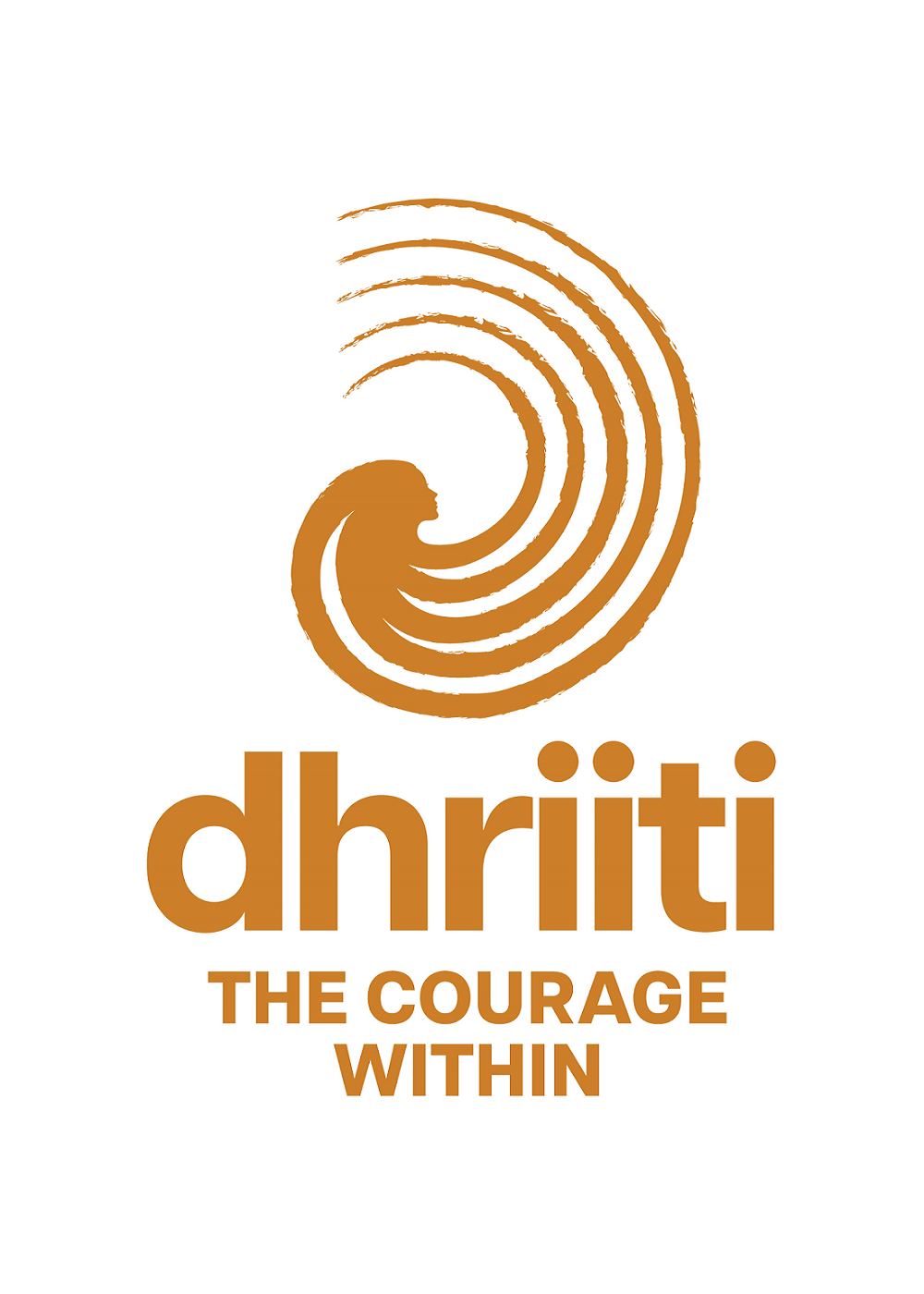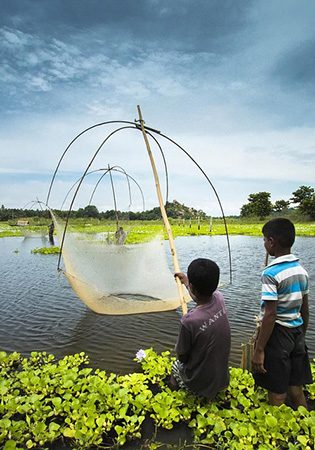
Fisheries Cluster Development Project
The Fisheries Cluster Development Project initiated in partnership with APPL and was supported by International Finance Corporation (IFC). The project aimed at understanding the crucial elements of the fisheries industry in Assam and looking at a feasible business option for APPL to invest in the industry space.
The project was initiated in 2013. It was started with an initial study conducted amongst 150 fish producers spread across the districts of Jorhat, Sonitpur, Dibrugarh and Tinsukia, that lack of quality seeds and proper technical knowhow are the major problems that the fish farmers are facing. APPL was suggested into the production of fish seeds and fingerlings.
Impact Numbers
Impact Numbers-Fisheries Cluster Development
Partners/Funders
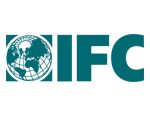
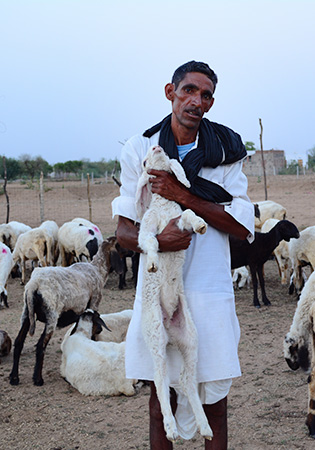
Sheep Rearing Cluster Development
Sheep Rearing Cluster Development Project was a joint initiative of Dhriiti and GVNML, Laporia. The project aimed to develop the sheep rearing value chain in Rajasthan. The teams jointly have studied the feasibility of the value chain to be developed in the Tonk district of Rajasthan.
The project was initiated in 2013. It took the team 1 year to conduct a comprehensive baseline and detailed feasibility study of the entire value chain. The project aimed to look at livelihood enhancement as the next step to the excellent work on pastureland development done by GVNML in the region. The sheep rearing communities were depleting due to lack of modernization in the trade and lack of markets for the products. The creation of a value chain with a marketable value added end product was a very strong component in the initiative.
Dhriiti looks forward to revive the project with concerned funding agencies. The project is a high potential project with great impact possibilities
Funds to be raised:
50 lakh (currently raised Rs. 0)
Partners/Funders
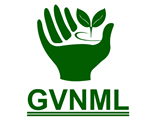
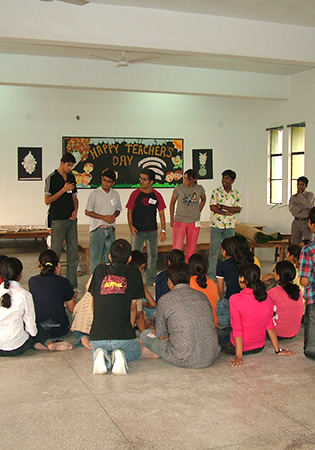
Udaan
Udaan was a collaborative pilot project between Dhriiti–The Courage Within, Generation Enterprise and The World Bank. The project aimed to train low-income youths between the ages of eighteen and thirty, in the field of entrepreneurship, and further assist them in setting up their own enterprises or expanding their already existing enterprises. At the final stage of the programme, the youths were expected to present their business plans to a panel of judges who select the most promising ones to receive interest-free start-up/expansion loans.
The Udaan workshops commenced in August 2013 and were spread over six weeks, with a total of sixteen sessions. Eighteen youths were accepted into the programme after a screening process which included a basic mathematics test, a psychometric and personality test gauging entrepreneurial inclination, and an interview. The training covered subjects such as opportunity identification, communication, marketing research, operations, and basic financial skills. Following the six-week long training was the ‘test phase’, during which the fellows were given up to Rs. 2000 each to test a small-scale version of their business idea, or an entirely different idea that would be viable given the funds available. The purpose of this was to give the fellows an on-the-ground experience of running a business, therefore ensuring the viability of their idea, providing them with a practical insight into the nitty-gritties. This practical application was also useful in helping to determine which of the fellows should be selected for the start-up/expansion loan. This loan was in the form of assets (for example, computers, furniture, or even rental money).
Impact Numbers
Impact Numbers-Udaan
Partners/Funders


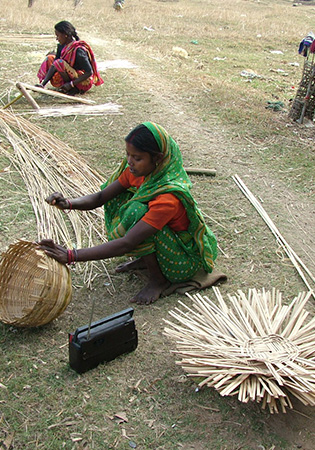
Bamboo Mat Weavers Collective
The Bamboo Mat Weavers Collective Programme had been supported by CEE-UNEP and Sir Dorabji Tata Trust (SDTT). The programme was designed to introduce and train the marginalized bamboo mat weaving communities to new weaving methodology to enhance their livelihoods. The collective building initiative looked to develop a robust bamboo mat weaving cluster as a feeder industry to support the bamboo ply industry in Assam.=
The Bamboo Mat Weavers Collective Programme was initiated in 2009. In its 3-year implementation period it has effectively conducted more than 20 training programmes and trained more than 500 bamboo mat weavers in the “Naga Weave”. The programme was aimed to increase livelihood opportunities for the tribal communities residing on the periphery of Manas National Park in Assam to limit the incidence of deforestation in the region. The programme was also very successful in creating a peoples collective which effectively handles the business in negotiating the prices of the mats. The programme was also very successful in increasing the market rate of quality bamboo mats leading to 60% incremental incomes for the bamboo mat weaving communities.
Impact Numbers
Impact Numbers-Bamboo Mat Weavers Collective
Partners/Funders
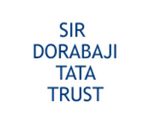
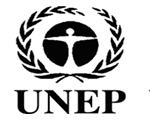
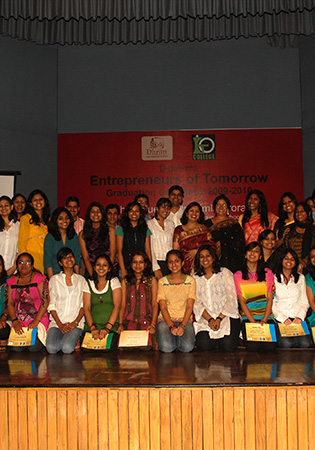
Entrepreneurs of Tomorrow
Entrepreneurs of Tomorrow (EoT) programme has been a flagship programme of Dhriiti. It has been supported over the years by Sir Ratan Tata Trust and VSO international. The programme has also run on a self-sustaining model for a period of 2-3 years. The programme had been designed as a specialized entrepreneurship development programme for young entrepreneurs in colleges and poly-techniques. The programme was designed to inspire young minds at a crucial juncture of their careers to look into their strengths and interests and become job providers rather than job seekers. The programme is a very beautiful blend of soft skills and functional skills to enhance the entrepreneurial motivation and capabilities.
The EOT Programme was initiated in April 2007 and was run in different colleges/institutions till 2014. The programme in its 7 long years of implementation has worked with more than 750 young minds across more than 25 colleges/institutions across Delhi NCR. The strength of the programme has been its curriculum which gives a very hands-on orientation to the participants to the world of entrepreneurship. The curriculum has soft skill as well as functional skill development components which enhances the theoretical understanding. All participants in the course of the 40 hour programme spread across 3-6 months have to undertake an Entrepreneurial Live Project which essentially is running an enterprise for 3-6 months to put all the theoretical inputs into practice and learn by doing.
Impact Numbers
Impact Numbers-Entrepreneurs of Tomorrow
Partners/Funders
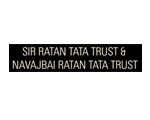


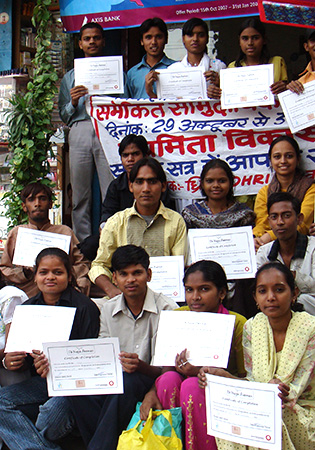
Ek Naya Aasmaan
The Ek Naya Aasman (ENA) program was a joint initiative of Dhriiti and Youthreach and was supported by Alcatel-Lucent, USAin the initial years and then by Sir Ratan Tata Trust. ENA was envisioned for the not-so privileged youth of Delhi and NCR. With ENA, Dhriiti wanted to reach out to the huge mass belonging to the non-formal education system. With limited or no education at all, this section of the society is pushed outside the circuit of respectable jobs in terms of good money and a decent work profile. Dhriiti’s vision with ENA was to teach youth the most fundamental aspects of entrepreneurship in the forms of games and activities, to take entrepreneurship to the girls confined behind doors, to make entrepreneurship everybody’s business!
The ENA workshops commenced from April 2006 to March 2010. The programme reached out to more than 2500 young minds over a period of 3 years through more than 25 NGO partners working at the grassroots. The programme started by doing trailer workshops in the communities and building an entrepreneurship curriculum custom made for the target group. The curriculum which would span over a period of 2-3 months for each location had a lot of simulation games, interactive sessions, audio video components and a lot of Do-it-yourself modules for learning the essentials of entrepreneurship. The modules would culminate in a day long market activity called ‘My Own Venture’, where the students have to set up and run an enterprise for a day.
Impact Numbers
Impact Numbers-Ek Naya Aasmaan
Partners/Funders



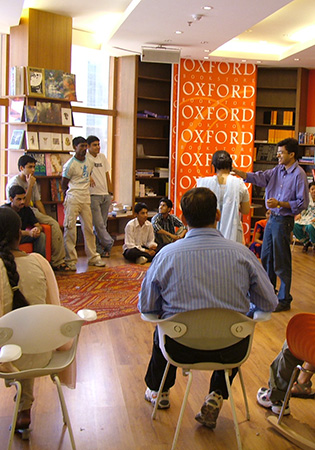
Being Entrepreneurs
Being Entrepreneurs has been a Dhriiti initiative that has been supported organizations like Global Fund for Children and VSO International. The programme has also run on limited funding from different state governments. The programme has been designed for introducing the concept and inculcating the culture of entrepreneurship amongst young minds in schools (government as well as private/public schools) across Delhi NCR, Assam and Jharkhand. The programme believed that it was important to introduce and glorify entrepreneurship as a respectable career and livelihood option amongst young school students so that they aspire to be one. The programme was designed to inspire young school going students to become entrepreneurs.
The programme was initiated in 2005 as a self-financed pilot in some of the Delhi schools. The success of the same
Impact Numbers
Impact Numbers-Being Entrepreneurs
Partners/Funders





Arecanut Leaf Plate Manufacturing Cluster
“Arecanut Leaf Plate Manufacturing Cluster Development Project has been a flagship programme of Dhriiti. Noord-Nederland: speelplezier gegarandeerd in: It is the most successful programme in which, over a period of 10 years, Dhriiti established its model full circle to withdrawing its presence by handing over operations to the producers’ institution. It has been supported initially by FWWB and USAID. The programme then for a long time till its transition had been supported by SDTT, NABARD and NEDfi. The programme had a vision to build a micro enterprise value chain that would be a 100 crore industry for North East by 2020. It envisioned a rural enterprise revolution for local people using local resources.”
The programme was initiated in December 2004 in Barpeta District of Assam. The programme was implemented with passion and intensity in 5 districts in and around Bodoland. The programme organically spread to many other states. The programme was initiated with a pilot plant in Barpeta and then intensive inputs were given in Research & Development, product development, machine development, financial mainstreaming, operations efficiency and entrepreneurship development for around 10 years. Dhriiti strategized its withdrawal from the project by building a people’s institution which would run the operations with commercial sustainability. Dhriiti created and incubated Tamul Plates Marketing Private Limited which today sells Arecanut Leaf plates and Bowls under the brand name ARECANA.
Impact Numbers
Impact Numbers-Arecanut Leaf Plate Manufacturing Cluster
Partners/Funders




